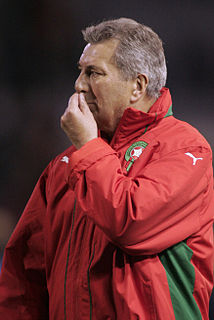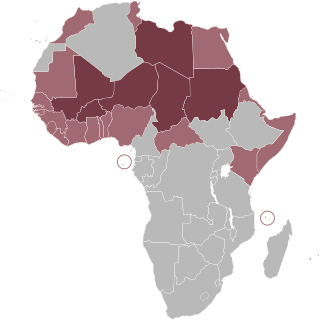Related Research Articles

Morocco, officially the Kingdom of Morocco, is the northwesternmost country in the Maghreb region of North Africa. It overlooks the Mediterranean Sea to the north and the Atlantic Ocean to the west, and has land borders with Algeria to the east, and the disputed territory of Western Sahara to the south. Morocco also claims the Spanish exclaves of Ceuta, Melilla and Peñón de Vélez de la Gomera, and several small Spanish-controlled islands off its coast. It spans an area of 446,550 km2 (172,410 sq mi) or 710,850 km2 (274,460 sq mi), with a population of roughly 37 million. Its official and predominant religion is Islam, and the official languages are Arabic and Berber; the Moroccan dialect of Arabic and French are also widely spoken. Moroccan identity and culture is a vibrant mix of Berber, Arab, and European cultures. Its capital is Rabat, while its largest city is Casablanca.
Morocco is a member of the United Nations and belongs to the African Union, Arab League, Arab Maghreb Union (UMA), Organisation of Islamic Cooperation (OIC), the Non-Aligned Movement and the Community of Sahel-Saharan States (CEN_SAD). Morocco's relationships vary greatly between African, Arab, and Western states. Morocco has had strong ties with the West in order to gain economic and political benefits. France and Spain remain the primary trade partners, as well as the primary creditors and foreign investors in Morocco. From the total foreign investments in Morocco, the European Union invests approximately 73.5%, whereas, the Arab world invests only 19.3%. Many countries from the Persian Gulf and Maghreb regions are also getting more involved in large-scale development projects in Morocco.

North Africa or Northern Africa is a region encompassing the northern portion of the African continent. There is no singularly accepted scope for the region, and it is sometimes defined as stretching from the Atlantic shores of Mauritania in the west, to Egypt's Suez Canal and the Red Sea in the east. Varying sources limit it to the countries of Algeria, Libya, Morocco, and Tunisia, a region that was known by the French during colonial times as "Afrique du Nord" and is known by Arabs as the Maghreb. The United Nations definition includes Morocco, Algeria, Tunisia, Libya, Egypt, Sudan, and the Western Sahara, the territory disputed between Morocco and the Sahrawi Republic. The African Union definition includes the Western Sahara and Mauritania but not Sudan. When used in the term Middle East and North Africa (MENA), it often refers only to the countries of the Maghreb.
OSS may refer to:

Western Sahara, formerly the Spanish colony of Spanish Sahara, is a disputed territory claimed by both the Kingdom of Morocco and the Popular Front for the Liberation of the Saguia el Hamra and Rio de Oro, which is an independence movement based in Algeria. It is listed by the United Nations (UN) as a non-decolonized territory and is thus included in the United Nations list of Non-Self-Governing Territories.

The Sahara is a desert on the African continent. With an area of 9,200,000 square kilometres (3,600,000 sq mi), it is the largest hot desert in the world and the third largest desert overall, smaller only than the deserts of Antarctica and the northern Arctic.

The Maghreb, also known as Northwest Africa and the Arab Maghreb, is the western part of North Africa and the Arab world. The region includes Algeria, Libya, Mauritania, Morocco and Tunisia. The Maghreb also includes the disputed territories of Western Sahara and the Spanish cities Ceuta and Melilla. As of 2018, the region had a population of over 100 million people.

MENA is an English-language acronym referring to the Middle East and North Africa. It is alternatively called the WANA. The MENA acronym is often used in academia, military planning, disaster relief, media planning as a broadcast region, and business writing. Moreover, the region shares a number of cultural, economic and environmental similarities across the countries; for example, some of the most extreme impacts of climate change will be felt in the region.

The Arab Maghreb Union (AMU) is a trade agreement aiming for economic and future political unity among Arab countries of the Maghreb in North Africa. Its members are the nations of Algeria, Libya, Mauritania, Morocco and Tunisia. The Union has been unable to achieve tangible progress on its goals due to deep economic and political disagreements between Morocco and Algeria regarding, among others, the issue of Western Sahara. No high level meetings have taken place since 3 July 2008, and commentators regard the Union as largely dormant.

Roger Léon Maurice Lemerre-Desprez is a French professional football manager and former player. During his managerial career, he was in charge of three national teams: the French, Tunisian and Moroccan national teams. He also managed numerous clubs in France, Tunisia, Turkey and Algeria. He is currently the head coach of Étoile du Sahel.
Ecological indicators are used to communicate information about ecosystems and the impact human activity has on ecosystems to groups such as the public or government policy makers. Ecosystems are complex and ecological indicators can help describe them in simpler terms that can be understood and used by non-scientists to make management decisions. For example, the number of different beetle taxa found in a field can be used as an indicator of biodiversity.

The Community of Sahel–Saharan States aims to create a free trade area within a region of Africa. There are questions with regard to whether its level of economic integration qualifies it under the enabling clause of the General Agreement on Tariffs and Trade (GATT).

The Great Green Wall or Great Green Wall of the Sahara and the Sahel is a project led by the African Union, initially conceived as a way to combat desertification in the Sahel region and hold back expansion of the Sahara, by planting a wall of trees stretching across the entire Sahel. It has since evolved into a program promoting water harvesting techniques, greenery protection and improving indigenous land use techniques, aimed at creating a mosaic of green and productive landscapes across North Africa.
The Tunisian Ligue Professionnelle 1 was previously called the Tunisian National Championship between 1956 and 1994. is the top division football tournament in Tunisia under the organization of the Tunisian Football Federation. The first edition was held during the French protectorate of Tunisia, the 1907 season, under the auspices of the Federation of Union des Sociétés Françaises de Sports Athlétiques, and it was played in a knockout system, and the first official match in the history of the tournament was played on 9 June 1907.

The Western Sahara Autonomy Proposal is an initiative proposed by Morocco in 2006 as a possible solution to the Western Sahara conflict. In 2006, the Moroccan Royal Advisory Council for Saharan Affairs (CORCAS) proposed a plan for the autonomy of Western Sahara and made visits to a number of countries to explain the proposal. The Spanish approach to regional autonomy has been named as a possible model for Western Saharan autonomy, mentioning specifically the cases of the Canary Islands, the Basque Country, Andalusia or Catalonia. The plan was presented to the UN Security Council in April 2007 and received the backing of the United States and France. This initiative constituted the main ground for the Moroccan proposal at Manhasset negotiations.

Operation Juniper Shield, formerly known as Operation Enduring Freedom – Trans Sahara (OEF-TS), is the military operation conducted by the United States and partner nations in the Sahara/Sahel region of Africa, consisting of counterterrorism efforts and policing of arms and drug trafficking across central Africa. It is part of the Global War on Terrorism (GWOT). The other OEF mission in Africa is Operation Enduring Freedom – Horn of Africa (OEF-HOA).

The insurgency in the Maghreb refers to the Islamist insurgency in the Maghreb and Sahel regions of North Africa that followed on from the Algerian Civil War. The Algerian militant group Salafist Group for Preaching and Combat (GSPC) allied itself with al-Qaeda to eventually become al-Qaeda in the Islamic Maghreb (AQIM). The Algerian and other Maghreb governments fighting the militants have worked with the United States and the United Kingdom since 2007, when Operation Enduring Freedom – Trans Sahara began. While the 2011 Arab Spring affected support for the insurgency, it also presented military opportunities for the jihadists. In 2012, AQIM and Islamist allies captured the northern half of Mali, until being fought back less than a year later following a French-led foreign intervention, which was succeeded by the Sahel-wide Operation Barkhane. In Libya, the Islamic State of Iraq and the Levant (ISIL) has been able to control some limited territory in the ongoing civil war since 2014, amid allegations of local collaboration between the rival AQIM and ISIL.

Faouzi Benzarti is a Tunisian former football player and the current coach of US Monastir. He spent his entire career as a player at his home club US Monastir without any achievements. His training career began and was only 29 years old, making it the youngest Tunisian coach at the time. He is considered one of the most successful coaches in Tunisia. He usually uses offensive play and a high-pressure plan as he is known for his toughness in training and his excessive anger towards his players and referees. During his managerial career, he was in charge of two national teams: the Tunisian and Libyan national football teams, he was also close to signing with the Moroccan team in 2016 before appointing Hervé Renard.

The North African ostrich, red-necked ostrich, or Barbary ostrich is the nominate subspecies of the common ostrich from West and North Africa. It is the largest subspecies, making it the largest living bird.
References
- 1 2 "Sahara and Sahel Observatory" (PDF). World Meteorological Organisation. 21 March 2013. Retrieved 14 December 2016.
- ↑ "Morocco Elected Chair of Sahara-Sahel Observatory". Lemag.ma. 28 April 2016. Retrieved 14 December 2016.